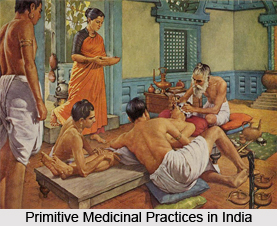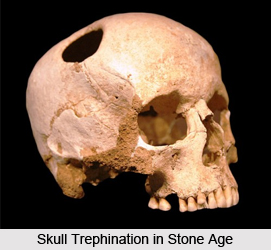 Inoculation against small-pox and snake-bite were per¬formed by rubbing the contents of a pustule into an incision in the skin. In the long process of discovering which plants are edible, humans in the Stone Age also identify many which seem to cure ailments or soothe a fever. "Venesection" was performed on various veins. Even a difficult and severe operation as "Trephining" of the skull was performed by the primitive men as early as the Stone Age. Modern research has brought to light the skulls on which it was performed. Even the world"s earliest surgical operation, practised at least 4000 years ago, is more probably intended to strengthen the doctor"s own powers than to cure a patient.
Inoculation against small-pox and snake-bite were per¬formed by rubbing the contents of a pustule into an incision in the skin. In the long process of discovering which plants are edible, humans in the Stone Age also identify many which seem to cure ailments or soothe a fever. "Venesection" was performed on various veins. Even a difficult and severe operation as "Trephining" of the skull was performed by the primitive men as early as the Stone Age. Modern research has brought to light the skulls on which it was performed. Even the world"s earliest surgical operation, practised at least 4000 years ago, is more probably intended to strengthen the doctor"s own powers than to cure a patient.
Medicinal Practice in Vedic Age
Dur¬ing the Vedic ages the course of instruction lasted for 6 years and included the mastery of the basic standard medi¬cal works as well as practical training in medicine and surgery under the guidance of qualified and reputed teach¬ers. After the completion of the study, permission to prac¬tice had to be obtained from the king, like the various board certifications of the present world. The Indians developed the system of prognostication and differential diagnosis to a very high degree.
Sushruta, the founding father of Indian medicine, establishes a tradition later enshrined in a classic text, the "Sushruta Samhita". He identifies 1120 diseases, lists 760 medicinal drugs, and says that the surgeon"s equipment amounts to 20 sharp instruments including knives, scissors, saws and needles and 101 blunt ones such as forceps, tubes, levers, hooks and probes.
 His explanation of how to rebuild a patient"s nose has given him the status of the "First Plastic Surgeon". This is an important operation in Ancient India. Amputation of the nose is a punishment for adultery.
His explanation of how to rebuild a patient"s nose has given him the status of the "First Plastic Surgeon". This is an important operation in Ancient India. Amputation of the nose is a punishment for adultery.
Indian medicine enshrines the theory that the human body consists of three substances, and that health requires a balance between them. They are usually translated as spirit, phlegm and bile.
In surgery, the attainments of the Indians, which were based entirely on keen observation, rich experience and rational considerations remained unrivalled for many cen¬turies by any other nation. Their most astonishing perfor¬mances were in the domains of laparotomy, lithotomy and plastic surgery. As a matter of fact the plastic surgery of the 19th century was stimulated by the example of Indian methods.
Medicinal Practice in Modern India
When civilization advanced, various people made im¬provements in their own contributions to the theory and practice of medicine. The contribution of India to the science of medicine is immense. Its medical literature is rich, varied and of great importance. Its wealth of knowledge and systematic devel¬opment is admired even by a modern medical person. It prescribed a high standard of medical ethics and etiquette, as well as for the qualification necessary for a student of medicine.
The Indians seemed to have anticipated the principle on which modern system of Homeopathy is based. Also credit should be given for the use of hypnotism in connection with surgical operation. Under the influence of Buddhism, the care for the sick developed further and consequently hospitals, homes and pharmacies were established.
Related Articles
Ancient History of India
Vedic Civilisation in India
Sushruta
Sushruta Samhita
Traditional Indian Medicines




















